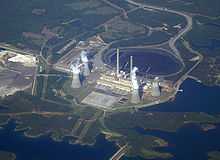Beyond a smart grid to mix and match the supply solar and wind to get rid of any need for new coal or nuclear plants, as  FERC Chairman Jon Wellinghoff recommended three years ago, FERC also has plans to mix and match demand. Energy customers can volunteer to shut off their air conditioners or clothes dryers automatically if there’s not enough supply. This could facilitate adding solar power, by basically acknowledging that it may not always supply a fixed capacity.
FERC Chairman Jon Wellinghoff recommended three years ago, FERC also has plans to mix and match demand. Energy customers can volunteer to shut off their air conditioners or clothes dryers automatically if there’s not enough supply. This could facilitate adding solar power, by basically acknowledging that it may not always supply a fixed capacity.
Todd Griset wrote for law firm PretiFlaherty 23 April 2012, FERC seeks demand response standards,
Demand response, an innovative strategy to ensuring the integrity of electric grids, is growing in popularity, prompting federal regulators to consider standardizing how demand response performance is measured.
Managing an electric grid entails ensuring a constant balance between electric generation and customer demand for electricity. As customer demand rises, grid operators have traditionally called on more and more generating units. In most markets, grid operators dispatch the lowest-cost units first to keep overall costs down. As a result, generating units needed to meet peak demand tend to be more expensive than baseload generation. Many peaking units also emit more pollutants per unit of energy than baseload units.
In a demand response program, customers can volunteer to be available to reduce their load during times of peak demand. When done right, this reduction in customer demand can play much the same role as dispatching additional generation, but at a lower cost in dollars and environmental impacts. Energy efficiency resources can also play a similar role.
The U.S. Congress and the Federal Energy Regulatory Commission have both recognized that demand response can be a decentralized, crowd-sourced alternative to peaking power plants. Utilities and regional transmission organizations across the nation are implementing demand response programs.
Across the nation…. How about it, Georgia Power, and Georgia EMCs? How are your demand response programs coming?
-jsq














